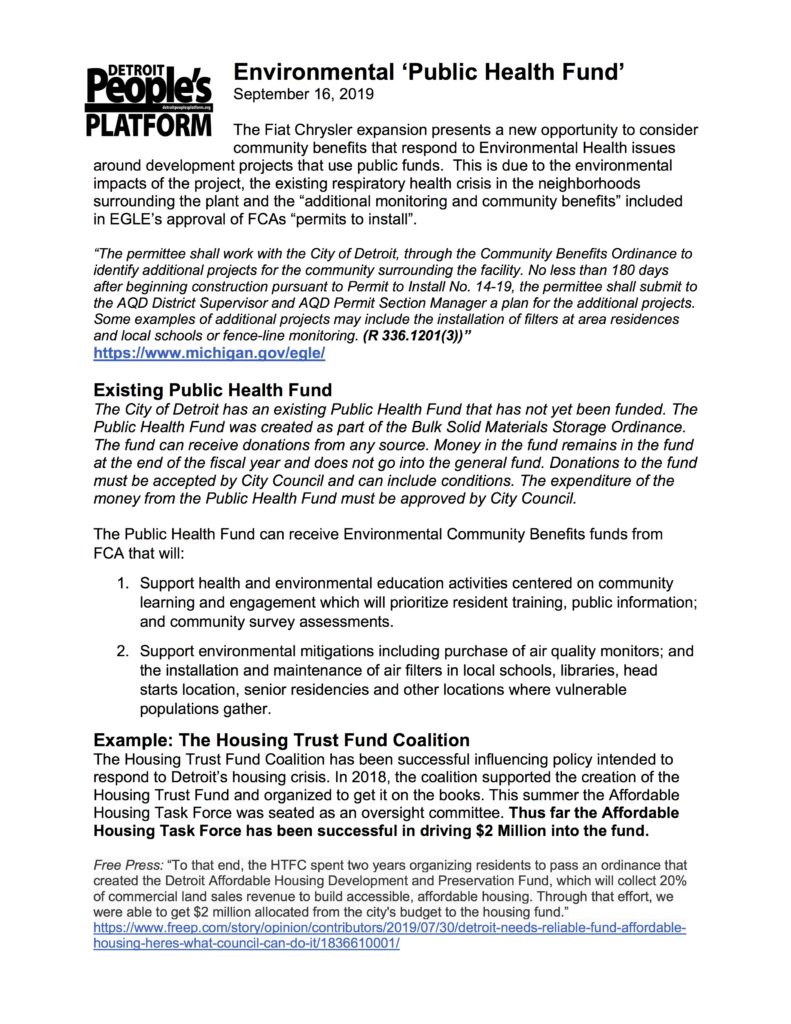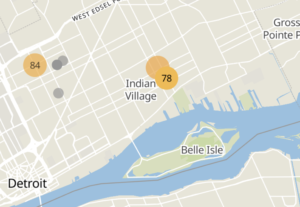September 16, 2019
The Fiat Chrysler expansion presents a new opportunity to consider community benefits that respond to Environmental Health issues around development projects that use public funds. This is due to the environmental impacts of the project, the existing respiratory health crisis in the neighborhoods surrounding the plant and the “additional monitoring and community benefits” included in EGLE’s approval of FCAs “permits to install”.
“The permittee shall work with the City of Detroit, through the Community Benefits Ordinance to identify additional projects for the community surrounding the facility. No less than 180 days after beginning construction pursuant to Permit to Install No. 14-19, the permittee shall submit to the AQD District Supervisor and AQD Permit Section Manager a plan for the additional projects. Some examples of additional projects may include the installation of filters at area residences and local schools or fence-line monitoring.(R 336.1201(3))” https://www.michigan.gov/egle/
Existing Public Health Fund
The City of Detroit has an existing Public Health Fund that has not yet been funded. The Public Health Fund was created as part of the Bulk Solid Materials Storage Ordinance. The fund can receive donations from any source. Money in the fund remains in the fund at the end of the fiscal year and does not go into the general fund. Donations to the fund must be accepted by City Council and can include conditions. The expenditure of the money from the Public Health Fund must be approved by City Council.
The Public Health Fund can receive Environmental Community Benefits funds from FCA that will:
- Support health and environmental education activities centered on community learning and engagement which will prioritize resident training, public information; and community survey assessments.
- Support environmental mitigations including purchase of air quality monitors; and the installation and maintenance of air filters in local schools, libraries, head starts location, senior residencies and other locations where vulnerable populations gather.
Example: The Housing Trust Fund Coalition
The Housing Trust Fund Coalition has been successful influencing policy intended to respond to Detroit’s housing crisis. In 2018, the coalition supported the creation of the Housing Trust Fund and organized to get it on the books. This summer the Affordable Housing Task Force was seated as an oversight committee. Thus far the Affordable Housing Task Force has been successful in driving $2 Million into the fund.
Free Press:“To that end, the HTFC spent two years organizing residents to pass an ordinance that created the Detroit Affordable Housing Development and Preservation Fund, which will collect 20% of commercial land sales revenue to build accessible, affordable housing. Through that effort, we were able to get $2 million allocated from the city’s budget to the housing fund.” https://www.freep.com/story/opinion/contributors/2019/07/30/detroit-needs-reliable-fund-affordable-housing-heres-what-council-can-do-it/1836610001/

